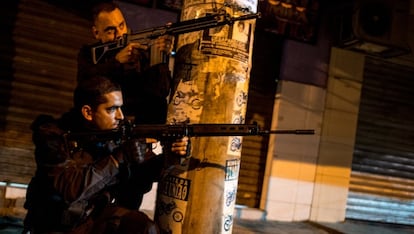Rio police win back notorious drug district
Heavily armed forces move into Complexo da Mará without firing a shot

In little more than 15 minutes and without a single shot fired, military police contingents early Sunday successfully invaded one of the most dangerous neighborhoods in Rio de Janeiro, a heavily guarded district that has been controlled by powerful drug-traffickers in recent years.
More than 1,500 armed officers equipped with 21 tanks poured into the wide and twisting streets of the Complexo da Maré, a sprawling neighborhood district located between Rio’s Olympic stadium and the Antonio Carlos Jobim International Airport.
The area’s 130,000 residents had for years been caught between the bloody rivalries of the two drug gangs that have fought for control of Maré: Comando Vermelho (CV) and Amigos dos Amigos (ADA). At the same time, growing factions of militant groups had been emerging in Mará, which also fueled tensions among the traffickers.
The entire area had become one of Rio de Janeiro’s major crime centers from where arms sales, kidnappings, extortion and murders were also planned, authorities said.
City government officials gave advanced warnings that troops would be moving into Maré to secure the district, including the 16 shantytowns where most residents live.
According to security authorities, more than 100 individuals were arrested, including an alleged local drug lord, Marcelo Santos das Dores, known as “Menor P” (Little P), who reportedly controlled the trade in 11 shantytowns.
The situation can’t get any worse than it has been,” said one lady
Menor P was captured on Thursday in an apartment building in the middle-class neighborhood of Jacarepaguá in west Rio. His arrest was crucial for authorities trying to seek and capture his lieutenants who operate in the shantytowns, explained one official.
But authorities believe that many other wanted criminals faded into other neighboring areas where their drug-trafficking gangs also maintain control.
Many security analysts have criticized the government’s strategy of announcing beforehand that it would be taking over a particular shantytown or district because it gives time for many criminals to escape.
EL PAÍS accompanied several elite police units as they entered the Nova Holanda shantytown on Sunday. With air support from navy helicopters carrying sharpshooters, groups of between five and eight soldiers fanned out across the poor neighborhood, searching house to house, as part of the offensive.
Officers routinely stopped passers-by and demanded to see their identification to check on hand-held computers whether they were wanted for any crimes.
Various stolen vehicles were located and sniffer dogs uncovered a backpack in one alley that was filled with weapons and marijuana paraphernalia with the letters “CV” printed on the items.
In all, hundreds of searches led to the confiscations of assault rifles, machine guns and at least 450 kilograms of marijuana. Most of the residents remained inside their homes while the searches continued.
“We will soon see what happens from here on because the situation can’t get any worse than it has been,” said one lady, María, who sells fish at the entrance of Novo Holanda.
Another resident who declined to give her name said that she did not think anything would change because invasions in other shantytowns had been “complete failures.”
“The people in these shantytowns don’t trust the police because they believe the officers have a lack of respect for them,” said Mario Simão, of the NGO Favelas Observatory.
Authorities will complete their control of Maré in the coming months with the assignment of about 1,500 officers to be placed there permanently.
José Mariano Beltrame, Rio’s public security secretary, said the invasion had nothing to do with “exclusive action” because of the upcoming World Cup but was instead designed to help the people.
“We are going to give them back the land they deserve. The residents are the ones who own that land,” he said.
Tu suscripción se está usando en otro dispositivo
¿Quieres añadir otro usuario a tu suscripción?
Si continúas leyendo en este dispositivo, no se podrá leer en el otro.
FlechaTu suscripción se está usando en otro dispositivo y solo puedes acceder a EL PAÍS desde un dispositivo a la vez.
Si quieres compartir tu cuenta, cambia tu suscripción a la modalidad Premium, así podrás añadir otro usuario. Cada uno accederá con su propia cuenta de email, lo que os permitirá personalizar vuestra experiencia en EL PAÍS.
¿Tienes una suscripción de empresa? Accede aquí para contratar más cuentas.
En el caso de no saber quién está usando tu cuenta, te recomendamos cambiar tu contraseña aquí.
Si decides continuar compartiendo tu cuenta, este mensaje se mostrará en tu dispositivo y en el de la otra persona que está usando tu cuenta de forma indefinida, afectando a tu experiencia de lectura. Puedes consultar aquí los términos y condiciones de la suscripción digital.








































